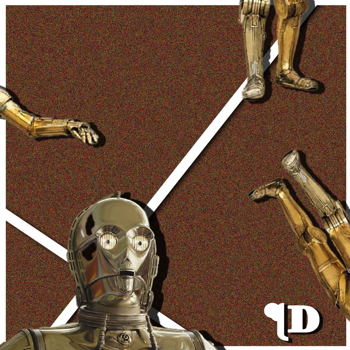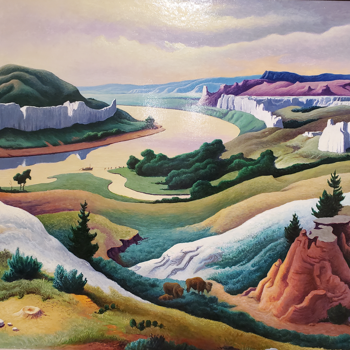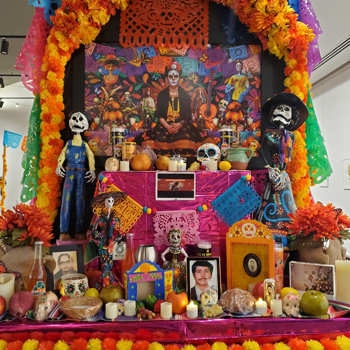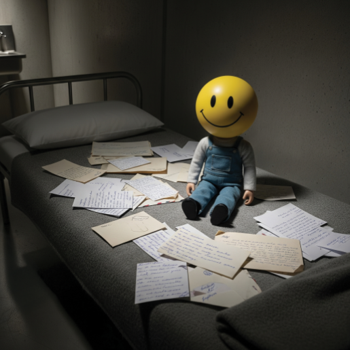Under There It’s Black
 Artwork by Jillian Witt
Artwork by Jillian Witt
On the upper deck, Henri leans against the railing watching the French coastline get swallowed in mist. It looks like a fraying rope, the coastline, stretched out and laid flat on the horizon. Gossamer clouds, like wedding veils, obscure the sun today, making the seawater the color of polished steel. Henri looks down into the water, watches it churn against the whitewashed hull. He can hear the steam engine chugging, can feel it in his toes. Some big machine pulsing beneath him, pushing this giant vessel through the waves.
He gathers his bags and goes a few decks below where there aren’t so many people. It’s dark and smells like wet laundry and there are definitely rats squeaking in the more hidden places. Out of his bags he pulls several sketches—drawings he’s done over the past few weeks—and studies them in the meager light. He growls, curses to himself. It’s in moments like these that Henri wishes he’d never discovered art at all. He feels tricked, duped into pursuing something he never should have.
In his defense, he hasn’t been practicing art for very long; he began in earnest when he was twenty and convalescing in a hospital bed. Mom brought him a set of crayons and some paper to keep him busy. This was a mistake. Within a month, Henri, against his father’s desperate pleas, quit his schooling and decided to dedicate himself to art full time.
Henri insists it wasn’t some rapturous experience, his discovering art. There wasn’t lighting and thunder—the Angel Gabriel didn’t come visit him in the night. But it did feel like he found passage down a corridor he hadn’t seen before, like he was finally granted entrance into a forbidden wing of a mansion. Henri’s heard about how scientists from all over Europe are discovering new chemical elements, building blocks of our universe; he likens discovering art to these scientific discoveries.
There are elemental forces out there—particles, waves, atoms, etc., that only once discovered do we understand their importance; but they have always been there, and will always be there, irrespective of humanity’s awareness of them. So it is with art. The next great painting, the next great art form, is floating around in a ghostly dimension we can’t quite clock into. It’s up to the artist to reach into this place and blindly root around, like a man on his tip-toes trying to pluck something off a shelf he can’t really reach, and come back with something new and useful. Something that, once discovered, seems wholly obvious. A Mona Lisa. A David. A Venus de Milo. These masterworks are no different, in Henri’s eyes, from the discoveries of Hydrogen, Helium, or the steam-powered engine.
A whistle blows: the ship is about to dock.
Henri stumbles among a throng of people down a ramshackle gangway, holding his duffel bag against his chest. The gangway angles to meet a dock which juts out of the island like a splinter stabbed into the moisture ripe stone. Passengers spread out on the dock, greeting people or moving hurriedly to complete some business. Henri finds John waiting here, his felt hat tipped on the back of his head, a bandana tied around his skinny neck the way some American cowboys do. The artist from down under: the strange Australian.
John smiles, calls in his funky voice, “Mr. Matisse! How was your journey?”
Henri hugs John. “Good. I’m starving.”
John takes Henri’s bag from him. “I’m sure. Let’s get you something to eat.”
They eat at a pub in the island’s main village. A village of fishy smells; a village where wetness glimmers on all the buildings as if they were smeared in tallow. Built back when the English still owned the island, the pub feels remarkably British. Tudor style, almost. The inside is lit by candlelight and the timber walls make Henri feel as if he’s in the belly of an old sailing ship. He orders potatoes and sausage and a pint of beer. His host orders the same. They’re served by a giant man who has a bad runny nose, the snot of which collects in his thick mustache.
“Here ya go,” the server says, dropping off the artist’s meals, wiping his nose with the back of his bare hand. “Need anything else?”
“Actually, yes,” John says. “My young friend and I are trying to settle something. Who would you say, in your own opinion of course, is the greatest artist?”
“Ever?” the server asks.
“Ever.” John affirms.
The server goes still, cocks his head back, stares at the ceiling, and licks his snotty mustache. “It’d have to be that Michelangelo, right? Guy who painted the big chapel and everything.”
“Not Rodin or Renoir or Gaugin?” John asks.
The server thinks. “Not too familiar with those ones. You’ll excuse me.”
The server walks away.
“What’s your point?” Henri asks.
“Try not to concern yourself with public opinion so much. Some of our greatest artists aren’t even household names. And, what’s more, some will never be.”
Henri stabs a sausage with his fork. “I get it. I get it.”
They eat in silence. The only indication it’s daytime is the dusty light that comes through a window across the pub. Through the window, Henri can see the grey water of the channel spreading out like a flat, shiny serving dish. England looms out there somewhere, Henri thinks, just beyond the horizon. He slips out his sketchbook and flattens it on the table: he wants to sketch the bar scene.
John looks at Henri, then shifts his eyes to watch Henri draw, his grey eyes tracking the flexion of Henri’s hand. John twists around in his seat, looking at the bar scene behind him, then back to Henri’s sketchbook.
“No, Henri, not that.”
“What?” Henri asks, innocently.
“It’s not worth your time to draw. It’s ugly.”
Henri frowns and lowers his head, embarrassed.
Like most young artists, Henri thinks everything he sees has some artistic value, whether it be a crumpled piece of trash or a weather-vane, and cannot yet discriminate between what is worthy of his attention and what is not. It is this focus—he will come to find as he ages into an old genius—that is one of the hallmarks of a great artist. Art is, at its basis, a discriminatory process.
A few fishermen burst into the pub then, their faces red from the wind and the cold and too much liquor. Their dark wool jackets sparkle with beads of moisture. One of them clocks John, smiles wildly.
“Johnny boy!” the fisherman cries. “Johnny the Aussie!”
The fisherman runs over and grabs John by the shoulders.
“Hey, Bill,” John says, not standing up to greet him. “How are you?”
“Fine. Fine. Where’s Marianna?” the fisherman says, looking over at Henri in disappointment.
“At home, I’m afraid,” John says.
“You’ll tell her I say hello?” the fisherman says, somewhat manically.
John nods. “Of course.”
The fisherman nods to Henri and walks back to his group.
John leans in toward Henri, whispers, “I’m afraid these fishermen mean to steal my wife from me. She’s become the talk of the whole island. A sort of mascot, almost.”
Henri chuckles. “You know they say a jealous man should never marry a beautiful woman.”
“Well,” John says, taking a swig of his beer, “good thing I’m not a jealous man or I’d be in deep trouble.”
Henri smiles.
“So, what have you been working on lately?” John asks. “I’m dying to know.”
Henri deflates a little and leans back in his chair. “Oh, you know, sketches here and there. Nothing great. Real shit, actually.”
“I doubt that,” John asserts. “Do you feel like you’re learning?”
Henri shrugs. “Not really.”
After lunch, they walk down a dirt path that traces the perimeter of the island. Seagulls, like shadowy boomerangs, weave through layers of mist above them, whining and crying. The path slopes near the sea so that rocky outcroppings, knuckled pillars of stone, can be seen jutting out of the channel water. The architecture of geology has no real purpose, Henri thinks, looking at the rocky fingers.
In his homeland—the North of France—people drew according to reference, every line being in exact relation to some real object: a door-hinge, a spring, a piston, etc. Drawing was utilitarian, done to achieve some functional purpose: instruction manuals, informational textbooks. There was rigidity and repetition—the old ways. But Henri does not see such purpose in his art. In fact, he sees art as, by definition, having no real purpose. Like the strange textures in the rocks before him, if it has any purpose, it can only be interpreted, speculated, guessed at in a subjective way. This is art’s greatest strength: its purposelessness. Art is, at its deepest level, a strange and beautiful reflection of the irrational, purposelessness of existence.
Henri stops walking and slips out his sketch-pad and pencil from his breast pocket. John turns back, smiles.
“You aren’t going to sketch those rocks, are you?” John asks. “Monet has already painted those about a thousand times.”
Henri lowers his sketch pad and sighs. “Probably because you’ve invited him here about a thousand times. This is my first time on the island, mind you.”
“Don’t be bitter.”
Henri pulls off his glasses, which have become foggy in the mist, and wipes them with a handkerchief. “Not bitter,” he says, “but you won’t let me draw anything, it seems.”
John scoffs. “Come on. Let’s get to my place before it’s dark.”
John’s home, built in the chateau style and straddling a ridge that overlooks the island, serves as Belle Isle’s unofficial capitol building—a landmark that the island’s inhabitants know and can navigate against. Here, John and Marianna preside like toy Monarchs, the unofficial royals of the island.
Yellow lights flicker in the house’s windows as John and Henri climb the incline towards its broad stone face. A slender shadow moves in one of the windows—it must be Marianna. When the men step inside the house, Marianna is there to meet them and helps John with his coat.
“You must be Mr. Matisse,” she says to Henri, leaning in and kissing him on the cheek. Henri nods and feels his face get hot. Tall, regal, favorite model of Rodin, Marianna stands a couple inches taller than Henri and looms like something born from a Greek fable: ancient, beautiful, timeless. Henri’s eyes meet hers and dart away, shyly, like a nervous child’s.
“I’ve just opened a bottle,” she says. “Why don’t we go to the dining room.”
John and Marianna sit on one side of a long mahogany table, shoulder to shoulder, leaning against each other as if for support, sipping from wine glasses and occasionally whispering to each other. Henri sits alone on the other side. He can’t help but feel like a child sitting before mother and father. Marianna asks Henri questions about his art, about painting, but when Henri answers these questions, her attention suddenly evaporates and she looks out the darkening windows or at her husband or the ceiling and does not verbally respond but smiles shallowly and nods. It’s obvious that she does not respect him as an artist, only humors him because John has brought him here. Why should she respect him anyway? This woman who has rubbed shoulders with Monet and Rodin and who is married to the great John Russell.
They polish off a couple bottles of wine. Henri feels warm and loose now, maybe a little tired. He slouches back in his chair as John and Marianna kiss, giggle, run their hands over each other’s shoulders, and whisper drunkenly, loudly, so that Henri can hear what is being said. Mostly smut. It’s as if they’ve forgotten he’s in the room with them. Embarrassed, Henri stands, takes his wine glass in his hands, and clears his throat.
“Thank you for the wine, Mrs. Russell,” Henri says, “but I better get going to bed now.”
John and Marianna separate slowly, as if disturbed, cut short, and John stands.
“Let me show you to your room,” he says.
Henri follows John through the dark house. Moonlight cuts up the dark, firing through windows, planting pearl rectangles on the walls, sometimes illuminating a painting or a bust. All of these artworks masterpieces done by some friend of John’s. As they wind through the house, John points languidly to these paintings, telling Henri the name of the artist and when it was done, his voice conveying no interest or excitement. Henri starts to think it was a mistake coming here.
They enter a small room on the far end of the house, a corner nook really, with windows on all sides. Moonlight pools here, stamps jailhouse bars of shadow on the floor. John points to a bed pressed up against the wall.
“That’ll work for you, Henri?” John asks. He wipes his forehead and takes a weird half-step backwards, like he just got pushed. He’s drunk.
“Yes,” Henri says. “Great. Thank you. And thank you for having me here.”
Henri places his bags near the foot of the bed and sits down on the edge of the mattress. He feels cold air shedding off the window panes. As he readies for bed, Henri realizes John’s still there, standing crookedly, looking out at nothing, crisp lines of shadow slicing his face into quadrants. He sways a little, mumbles to himself. Henri looks up at him, almost afraid.
“Is, is something wrong, John?” Henri finally asks.
John looks down at Henri, smiles drunkenly.
“You know those moments, right before you fall asleep, when you are sort of dreaming but also still sort of awake?” John asks.
Henri nods.
“What if you could paint something like that? Hm?”
“That— that would be something,” Henri says, a little confused.
“Ya know, something’s going to come along that’ll make us look like primitives,” John says, running his tongue along his lower lip. “Like cavemen painting on walls with clay pigments.”
John burps, scratches his underarm, and stumbles away into the darkness of his quiet house, softly calling his wife’s name.
On the morning Henri is to go home, the Russell’s make him a big breakfast. At the end of the meal, while they clear the table, John grows unusually quiet. He bites his lower lip and stares at Henri, his frosty eyes pinched, as if focusing on something in the distance. Henri feels, like he has many times during this trip, as if he's done something wrong.
“Sorry, John,” Henri whispers, “is something the matter?”
“Are you finished eating?” John asks.
Henri nods.
“Good.” There’s something I’d like to give you before you leave. Come with me.”
John’s studio is a short walk from the house; it can be seen peeking out from behind a cluster of trees whose leaves flicker like spinning coins in the sea breeze. It’s really just a wooden shed, the studio, and John refers to it proudly as “The Barn.” It’s dark inside; the two painters move as shadows, weaving past half-finished canvases and sculptures, to a writing desk pressed into a recess. John reaches into a bottom drawer and pulls out a leather folder bound by a knotted piece of tack rope.
“These have been tucked away here for a while,” John says in a low, almost reverent tone.
He unties the rope and flays open the leather folder with the care of a cleric opening an old scripture, revealing a stack of faded sketch paper mottled the color of caramel. John flips through the papers.
“Here,” he says, slipping one of them out of the stack. “I think you’d like this one.”
Henri takes the paper. It’s a basic sketch. Some kind of landscape—simple, bucolic, beautiful. Henri furrows his brow. He’s not sure what to make of it. Frankly, he’s never seen anything like it before. It’s childlike, almost mindless. It’d be laughable if it weren’t for some vulnerable genius undergirding its simplicity. Giant lines, confident shapes. Blatant. Unapologetic.
“J-John,” Henri stutters. “What is this? Is this yours?”
John laughs. “No, no.”
“Where did you get this?”
“From an old friend.”
John re-knots the tack rope, places the leather folder back in the drawer.
“Who?” Henri asks.
“He was a Dutchman,” John says, clapping dust off his hands and smiling in reminiscence. “He lived in Arles for a while. Drew that while he was there.”
“Is he still working in France?”
John smiles. “Let’s go back to the house.”
“John,” Henri says, now a little agitated. “Who did this? I’d love to meet him.”
“He’s dead, Henri. He sketched that more than ten years ago.”
“Oh,” Henri whispers, looking down at the sketch.
John sighs, moves to the door.
“I just don’t understand why I haven’t seen his work before,” Henri calls.
John unlatches the studio door, stepping into a shaft of bright morning sunlight. He plunges a cigarette between his lips, shrugs.
“Because, Henri, nobody knows anything about anything. Art least of all.”
As Henri boards the steamboat to go back to the mainland, he will ask John where he can see the Dutchman’s paintings. John will shrug unsmilingly and say he doesn’t know—the Dutchman never sold much.
“But that’s not why he painted,” John will say. “Maybe you could learn something from that.”
Henri will carry the sketch with him for the rest of his life. He will take it with him to Paris. It will be in his studio when his works are accepted at the salon. When he is named a Fauvist. It will be with him during his long rivalry with the Spanish cubist, the celebrity whose shadow will shade Henri his entire life. It will be with him in his home in the French Riviera when the Nazi’s take control of the continent.
It will be with him when the ‘50s roll around. He will be bedridden, overweight, and will wear a biblical beard and a wide-brimmed hat. He won’t be able to paint. He will sit in stiff-backed wooden chairs and, with scissors the size of pruning shears, make paper cutouts of pink and black and green… Always finding new ways.
But now, crouched in the humid aft of the steamboat, the boiler room thumping near him, Henri thinks the sketch comes alive in front of him. It could just be the candlelight or the rocking of the ship—but, no, the painting seems to breathe! The sketch rises off the page in yellow glory.
It's pitch black in the corners of this ship. And Henri stares into this blackness and wonders—suddenly wonders if this ship were to sink, and he and the sketch were lost to the sea, what would be the greater tragedy: the world losing Henri himself, or the world losing this single, roughly drawn sketch work? He decides he knows the answer.




